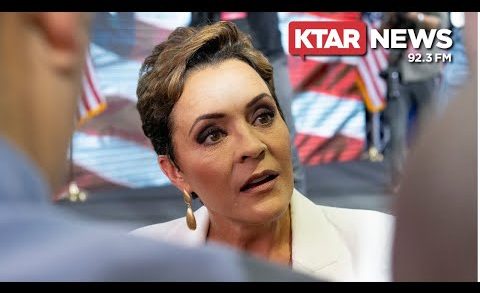Are you curious about Kari Lake’s views on education reform? Well, you’ve come to the right place! As a researcher delving into this topic, you’ll find that Kari Lake, a prominent figure in Arizona politics, has some interesting perspectives on how to improve the education system in the state. Let’s take a closer look at her views through a listicle framework.
1. **Support for School Choice**: Kari Lake is a strong advocate for school choice, believing that parents should have the freedom to choose the best education options for their children. She supports policies that promote charter schools, private schools, and homeschooling as alternatives to traditional public schools. Lake believes that competition in the education sector leads to improved outcomes for students.
2. **Emphasis on Vocational Education**: Lake has expressed a desire to expand vocational education programs in Arizona schools. She believes that not all students are suited for a traditional college education and that vocational training can provide valuable skills for students to enter the workforce directly after high school. Lake sees vocational education as a way to address the skills gap in the job market.
3. **Focus on Teacher Pay and Retention**: Lake has voiced concerns about teacher pay and retention in Arizona. She believes that attracting and retaining high-quality educators is crucial for improving the state’s education system. Lake supports efforts to increase teacher salaries and provide incentives for teachers to stay in the profession.
4. **Opposition to Common Core**: Lake has been critical of the Common Core State Standards, viewing them as a one-size-fits-all approach to education that hinders innovation and creativity in the classroom. She has called for the repeal of Common Core in Arizona and supports local control over curriculum decisions.
5. **Advocacy for Parental Involvement**: Lake believes that parents play a crucial role in their children’s education and should be actively involved in their schooling. She supports policies that empower parents to be more engaged in their children’s learning, such as school choice initiatives and increased transparency in education.
In conclusion, Kari Lake’s views on education reform are multifaceted and reflect a belief in empowering parents, supporting teachers, and expanding educational opportunities for students. Whether you agree or disagree with her perspectives, it’s clear that Lake is passionate about improving the education system in Arizona. As you continue to explore this topic, keep an open mind and consider the diverse viewpoints that shape the conversation around education reform.
Unveiling the Hobbs Education Plan: A Comprehensive Overview of the Proposed Initiatives for Education Reform
Are you curious about **Kari Lake’s views on education reform**? Well, let me tell you about the comprehensive overview of the proposed initiatives for education reform in the Hobbs Education Plan. This plan aims to address key issues in the education system and bring about positive changes for students, teachers, and schools alike.
One of the main focuses of the Hobbs Education Plan is to **improve student outcomes** by implementing evidence-based practices and innovative teaching methods. This includes personalized learning opportunities, increased access to technology, and support for students with diverse learning needs. By prioritizing student success, the plan aims to raise academic achievement levels and ensure that all students have the resources they need to thrive.
Furthermore, the Hobbs Education Plan also emphasizes the **professional development of teachers**.
By investing in teacher training programs, mentorship opportunities, and ongoing support, the plan aims to empower educators to excel in their roles and provide high-quality instruction to their students. This focus on teacher development is crucial for creating a positive learning environment and fostering a culture of continuous improvement within schools.
In addition, the plan includes initiatives to **promote parental involvement** in education. By establishing partnerships between schools and families, the plan aims to create a strong support system for students both inside and outside the classroom. This collaborative approach recognizes the important role that parents play in their children’s education and seeks to leverage their support to enhance student learning outcomes.
Overall, the Hobbs Education Plan offers a comprehensive overview of the proposed initiatives for education reform. By addressing key areas such as student outcomes, teacher development, and parental involvement, the plan aims to create a more equitable and effective education system that benefits all stakeholders. With a focus on evidence-based practices and innovative solutions, the plan sets a strong foundation for positive change in education.
Addressing the Root Issues: Proposals for Reforming Public Education in the United States
Are you curious about **Kari Lake’s views on education reform** in the United States? Well, let’s dive into the topic and explore some key points related to addressing the root issues and proposals for reforming public education.
One of the main aspects that Kari Lake focuses on when it comes to education reform is the need to **address the root issues** that are affecting the quality of public education in the United States. She believes that simply implementing superficial changes is not enough to bring about meaningful improvement. Instead, she advocates for a more holistic approach that takes into account factors such as **funding**, **teacher training**, **curriculum development**, and **student support services**.
In her proposals for reforming public education, Kari Lake emphasizes the importance of **increased funding** for schools in order to provide resources for things like updated **technology**, **school facilities**, and **educational materials**. She also highlights the need for **comprehensive teacher training programs** that focus on **equity**, **diversity**, and **inclusion**. Additionally, she suggests **revising the curriculum** to make it more relevant to the **21st-century workforce**, as well as expanding **student support services** to address issues such as mental health and **academic intervention**.
By addressing these root issues and implementing these proposals for reform, Kari Lake believes that public education in the United States can be transformed into a system that **equitably** and effectively prepares students for success in the modern world. With a focus on **holistic improvement** and **comprehensive support**, she hopes to see a brighter future for education in the country.
The Evolution of Education: A Look at the Transformations in Late 19th Century Schooling
Are you curious about Kari Lake’s views on education reform? Let’s take a closer look at how this topic relates to “The Evolution of Education: A Look at the Transformations in Late 19th Century Schooling.” In the late 19th century, education underwent significant transformations that laid the foundation for modern schooling systems. One of the key aspects of this evolution was the shift towards compulsory education for all children, regardless of social class or background. This marked a major turning point in the history of education, as it aimed to provide equal opportunities for learning to all individuals.
Moreover, the late 19th century saw the emergence of new teaching methods and pedagogical approaches that emphasized critical thinking, creativity, and practical skills. Educators began to recognize the importance of fostering independent thought and problem-solving abilities in students, rather than focusing solely on rote memorization. This shift towards a more holistic and student-centered approach to education laid the groundwork for the progressive education movements of the 20th century. As we reflect on these historical transformations, we can draw parallels to the ongoing debates surrounding education reform today. How can we continue to innovate and improve our education systems to meet the changing needs of students in the 21st century? Let’s explore these questions further to gain a deeper understanding of the evolution of education and its implications for the future.
In conclusion, **Kari Lake**’s views on education reform focus on increasing school choice, supporting teachers, and empowering parents to make decisions about their children’s education. She believes in promoting competition among schools to improve overall quality and provide more options for students and families. Lake advocates for accountability measures to ensure that taxpayer dollars are being used effectively and that students are receiving a quality education.
**Frequently Asked Questions**
**- What specific policies does Kari Lake support to improve education?**
**- How does Kari Lake plan to address the funding issues in education?**
**- What is Kari Lake’s stance on standardized testing in schools?**
In summary, **Kari Lake** is a proponent of education reform that prioritizes choice, accountability, and parental involvement. Her vision for education in Arizona centers around empowering individuals to make the best decisions for their children’s future while holding schools and educators to high standards of performance. Lake’s commitment to improving education through innovative policies and increased transparency sets her apart as a candidate dedicated to creating positive change in the education system.



